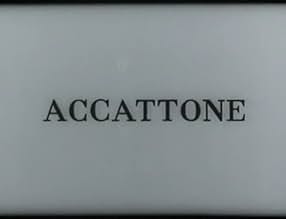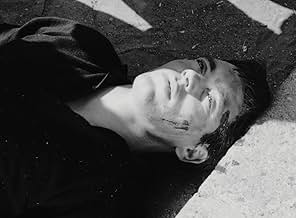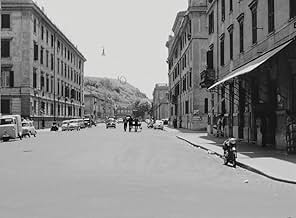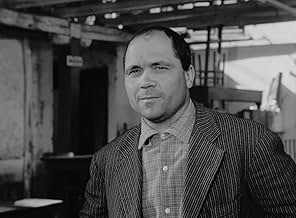IMDb रेटिंग
7.6/10
11 हज़ार
आपकी रेटिंग
अपनी भाषा में प्लॉट जोड़ेंA pimp with no other means to provide for himself finds his life spiraling out of control when his prostitute is sent to prison.A pimp with no other means to provide for himself finds his life spiraling out of control when his prostitute is sent to prison.A pimp with no other means to provide for himself finds his life spiraling out of control when his prostitute is sent to prison.
- 1 BAFTA अवार्ड के लिए नामांकित
- 3 जीत और कुल 4 नामांकन
फ़ीचर्ड समीक्षाएं
10NYLux
This is still a masterpiece of a film you can not afford not to see if you like Pasolini. "Accattone" is the directorial debut of the Italian neo-realist, Pier Paolo Pasolini, but by a strange coincidence it ended up being the very last of all his movies that I saw. I had seen everything he ever did, including short films by the time I got to "Accatone" and still found it masterful.
Franco Citti stars as the title character, he is a handsome pimp in Rome's post-war lower depths, with an endearing face that speaks volumes of his street-wise upbringing in the slums. To those unaccustomed with Southern Italian culture the way he spends his days with the other local pimps, playing cards and being lazy may seem vile, but it is actually a well grounded tradition, as is also his support of the entire family of his imprisoned friend, Ciccio, who depend on him for survival. He is obviously a fellow mobster, and their code of honor is at stake when Accatone discovers that he is in prison as a result of his whore, Maddalena, played by Silvana Corsini, who denounced Ciccio to the authorities. Even though she is recovering from a broken leg, Accatone forces her to go on the streets, where she is used, beaten and abandoned by Accatone's pals after he tells them the story, then she is found by the police and arrested. Accattone nearly starves to death from the total lack of income, he even sells all his jewelry to get by. He tries to reunite with his wife, with whom he has fathered at least one child, but she sees through his seduction act and her virile, beautiful brother beats up Accatone in an intense erotically-charged scene that seems to simulate sexual assault as much as violence between the men.
After meeting the innocent and beautiful Stella, (Franca Pasut) he is smitten and tries to get a job, so he can support her and his family but he is not accustomed to hardship and has the lack of patience that is typical of spoilt types that have never been trained to work does not make the job last for very long.
Never have I seen a more humane, direct and simple depiction of the tragic life of these undesirables of society. Pasolini is a master painter narrating with a few gestures all their hardship and suffering. Even getting a plate of food in this world is a memorable accomplishment. We see the whole setting as a sideline of modern society's inability to function properly. The 'corrections' by the police seem to be the most unjust of all, and Pasolini presents this panorama of human failing as an allegory of human struggle and spiritual redemption.
Franco Citti stars as the title character, he is a handsome pimp in Rome's post-war lower depths, with an endearing face that speaks volumes of his street-wise upbringing in the slums. To those unaccustomed with Southern Italian culture the way he spends his days with the other local pimps, playing cards and being lazy may seem vile, but it is actually a well grounded tradition, as is also his support of the entire family of his imprisoned friend, Ciccio, who depend on him for survival. He is obviously a fellow mobster, and their code of honor is at stake when Accatone discovers that he is in prison as a result of his whore, Maddalena, played by Silvana Corsini, who denounced Ciccio to the authorities. Even though she is recovering from a broken leg, Accatone forces her to go on the streets, where she is used, beaten and abandoned by Accatone's pals after he tells them the story, then she is found by the police and arrested. Accattone nearly starves to death from the total lack of income, he even sells all his jewelry to get by. He tries to reunite with his wife, with whom he has fathered at least one child, but she sees through his seduction act and her virile, beautiful brother beats up Accatone in an intense erotically-charged scene that seems to simulate sexual assault as much as violence between the men.
After meeting the innocent and beautiful Stella, (Franca Pasut) he is smitten and tries to get a job, so he can support her and his family but he is not accustomed to hardship and has the lack of patience that is typical of spoilt types that have never been trained to work does not make the job last for very long.
Never have I seen a more humane, direct and simple depiction of the tragic life of these undesirables of society. Pasolini is a master painter narrating with a few gestures all their hardship and suffering. Even getting a plate of food in this world is a memorable accomplishment. We see the whole setting as a sideline of modern society's inability to function properly. The 'corrections' by the police seem to be the most unjust of all, and Pasolini presents this panorama of human failing as an allegory of human struggle and spiritual redemption.
Accattone is a Neo-Realist examination of slovenly irresponsibility, tastelessness and self-pity - you know, the fun stuff. Its principal characters, a group of young upwardly-immobile Roman males, are almost uniformly repulsive, a lot of chest-baring half-savages whose idea of fun is luring a whore to a deserted spot and beating her to within an inch of her life. Its hero, Accattone, is played by one of the more unpleasant actors in the history of film, a fellow named Franco Citti, who manages to single-handedly set the entire nation of Italy back about two-hundred years. It is a film of almost relentless despair, depicting a Rome so desolate and squalid, so bereft of hope, that it seems almost medieval. In the hands of almost any director the movie would be unbearable - either unbearably sentimental or unbearably grim - but with Pasolini at the helm it is merely honest.
It isn't Pasolini's best film by a long way, but it may be the clearest example of what made the director so special - his ability to probe around the most revolting recesses of the human condition without seeming sensationalistic, exploitive or crass. It would be easy to go one of two directions with a character like Accattone, a lazy two-bit pimp with a son by a woman who wants nothing to do with him: the sentimental route or the grotesque. One could easily imagine De Sica, the soft-heart of Neo-Realism, turning Accattone into a sympathetic, misunderstood Everyman. And one could just as easily imagine Fellini, the most uptight director maybe in history, transforming the character into a universal symbol of societal decay. Pasolini, neither a sentimentalist nor a moralist, sees Accattone not as a sympathetic character nor as a symbol. The least judgmental director maybe ever, Pasolini conceives his characters entirely in terms of their outward behavior, and not in moral terms. He neither psycho-analyzes nor seeks to "understand" his characters. He simply presents them as they are, warts and all.
It was always the purpose of Neo-Realism to present life as it was lived, not life as it was imagined by screenwriters, directors and actors, and there are few more successful ventures in this regard than Accattone. The film's main triumph is in its atmosphere. The Roman days have never seemed so sun-bleached, so arid and oppressive; its nights never so mysterious, so full of inexpressible longing (not even in Henry James). The characters seem bound to this world in a palpable way, their faces (shot by expert cinematographer Tonino Delli Colli) mirroring the desolation, the hopelessness, the strangeness of their surroundings. The movie's physicality, as always with Pasolini, is striking. But pure physical vigor, pure atmosphere isn't enough. Where Pasolini comes up short is in assembling the parts of his film into something with real emotional breadth. His first feature shows him already on his way to being a master of the image, but also shows that he had a lot to learn about being a master of cinematic rhythm. The strange blend of primitivism and modernism is already there but the command is not. It's a film that works well in the moment but feels thin as a whole. It's a triumph of Neo-Realist technique but it only half-succeeds as a film.
Half-successful Pasolini is still better than the best most directors have to give. If you can portray a character as repulsive, as boorish and ego-maniacal as Accattone - a character with few if any redeeming features - for two hours without alienating your audience...well, chalk one up for the director who can do that. Especially one who manages the trick without resorting to sentimental contrivance or the kind of false significance people like Fellini always tried to drum up by filling their movies with obvious symbols, the sorts of things art-film zombies love because it gives them a chance to show their alleged smarts. Pasolini never flatters his audience but he never sneers at them either. He attempts to neither ingratiate himself with the public nor antagonize it in the manner of certain self-important avant-gardists. The best artists look for what interests them in a piece of material, not worrying whether their ideas, their approach, their style is accessible to the public at large, or critics, or scholars, or their grandmothers or anyone else. Accattone shows Pasolini on the road that would make him one of cinema's best directors - a road traveled by precisely one person, Pasolini himself.
It isn't Pasolini's best film by a long way, but it may be the clearest example of what made the director so special - his ability to probe around the most revolting recesses of the human condition without seeming sensationalistic, exploitive or crass. It would be easy to go one of two directions with a character like Accattone, a lazy two-bit pimp with a son by a woman who wants nothing to do with him: the sentimental route or the grotesque. One could easily imagine De Sica, the soft-heart of Neo-Realism, turning Accattone into a sympathetic, misunderstood Everyman. And one could just as easily imagine Fellini, the most uptight director maybe in history, transforming the character into a universal symbol of societal decay. Pasolini, neither a sentimentalist nor a moralist, sees Accattone not as a sympathetic character nor as a symbol. The least judgmental director maybe ever, Pasolini conceives his characters entirely in terms of their outward behavior, and not in moral terms. He neither psycho-analyzes nor seeks to "understand" his characters. He simply presents them as they are, warts and all.
It was always the purpose of Neo-Realism to present life as it was lived, not life as it was imagined by screenwriters, directors and actors, and there are few more successful ventures in this regard than Accattone. The film's main triumph is in its atmosphere. The Roman days have never seemed so sun-bleached, so arid and oppressive; its nights never so mysterious, so full of inexpressible longing (not even in Henry James). The characters seem bound to this world in a palpable way, their faces (shot by expert cinematographer Tonino Delli Colli) mirroring the desolation, the hopelessness, the strangeness of their surroundings. The movie's physicality, as always with Pasolini, is striking. But pure physical vigor, pure atmosphere isn't enough. Where Pasolini comes up short is in assembling the parts of his film into something with real emotional breadth. His first feature shows him already on his way to being a master of the image, but also shows that he had a lot to learn about being a master of cinematic rhythm. The strange blend of primitivism and modernism is already there but the command is not. It's a film that works well in the moment but feels thin as a whole. It's a triumph of Neo-Realist technique but it only half-succeeds as a film.
Half-successful Pasolini is still better than the best most directors have to give. If you can portray a character as repulsive, as boorish and ego-maniacal as Accattone - a character with few if any redeeming features - for two hours without alienating your audience...well, chalk one up for the director who can do that. Especially one who manages the trick without resorting to sentimental contrivance or the kind of false significance people like Fellini always tried to drum up by filling their movies with obvious symbols, the sorts of things art-film zombies love because it gives them a chance to show their alleged smarts. Pasolini never flatters his audience but he never sneers at them either. He attempts to neither ingratiate himself with the public nor antagonize it in the manner of certain self-important avant-gardists. The best artists look for what interests them in a piece of material, not worrying whether their ideas, their approach, their style is accessible to the public at large, or critics, or scholars, or their grandmothers or anyone else. Accattone shows Pasolini on the road that would make him one of cinema's best directors - a road traveled by precisely one person, Pasolini himself.
Just to start with, Accattone was not filmed in Naples but in Rome. Someone might have brought to that understanding by some Neapolitans gangsters that appear at some point in the movie As for the "ruins" that scatter the landscape, they are mostly buildings that will soon replace the barracks such as the one in which Accattone lives, or the Acquedotto Felice, an ancient Roman aqueduct that runs close to Prenestina and Casilina, two Roman suburbs, that you can see in Mamma Roma as well. Franco Citti, the character of Accattone, perfectly embodies the roman lumpenproletariat of the time: idle, fatalistic and desperate. Pasolini met Franco's brother Sergio, a plasterer, hanging around Cinecittà in 1951. He introduced him to his brother Franco that became Pasolini's dialectical adviser for Accattone, Mamma Roma and his book "Ragazzi di vita"; his "living vocabulary" as he called him. Indeed, Pasolini interests for dialects and slangs (Roman is not really a dialect anymore but a slang) was not disappointed. The dialogues between the characters are full of fantasy: rude and in some way reminiscent of their peasant past. A must see if you're interested in Neorealism and in the "ways of the underworld lumpenproletariat". Someone connected this movie with Bunuel's "Los Olvidados". I definitely agree.
Accattone is a Roman pimp who lives off his girlfriend Maddalena's earnings. Pasolini's cheeky aim is to put forward this young man as a modern saint. To this end he lathers Bach's St Matthew's Passion (inspired by the Apostle's experience of the crucifixion of Christ) over scenes of Accattone's life. Indeed in one of Accattone's first scenes he's shown devouring a slice of tomato, displayed horizontally as if a cardinal's galero, whilst an sculpture of perhaps a guardian angel can be seen over his shoulder in the distance (an anti-clerical pro-Christ stance seems to be a consistent theme for Pasolini). Later, a prophecy regarding Accattone's descent is eerily similar to Christ's pronunciation of Peter's forthcoming triple renunciation.
The film reminded me of a DH Lawrence poem (elliptically titled Democracy):
"I love the sun in any man / when I see it between his brows / clear, and fearless, even if tiny // But when I see these grey successful men / so hideous and corpse-like, utterly sunless, / like gross successful slaves mechanically waddling / then I am more than radical, I want to work a guillotine
...
I feel that when people have gone utterly sunless / they shouldn't exist."
Whatever Accattone is, he's not sunless; when he tries out the world of work (legitimate work involving labour), he becomes Vittorio, his Christian name, and the light goes out. The film reminds me very much of Fassbinder's Gods of the Plague in that sense, young men with brio but no skills or education who, given the choice, between drudgery or crime, choose crime. Both films polemicise against urban post-industrial capitalist societies, which have become increasingly removed from the milieu in which humanity evolved and is "designed" to cope with. When Accattone compares the chore of lifting rolls of iron with the horrors of Buchenwald the film goes a little over the top.
Of course someone viewing Accattone and his friends through less of a haze of desire than the director might think that they were just a bunch of jerks. Undeniably though, Pasolini is a great poet, and there's evidence of things to come here, the film whilst looking largely Bertoluccian (he was the assistant director), has the occasional master shot, for example the rolling hills and valley in the dream sequence, par with Leonardo in quality of composition and symbolism; the countryside here representing an idealised rural precursor to Accattone's slum existence.
I also applaud Pasolini for taking his arguments beyond class, Accattone's group of spongers contains educated men as well as dunces, and they are equally disdainful of the ruling class as they are of proletarians.
The film reminded me of a DH Lawrence poem (elliptically titled Democracy):
"I love the sun in any man / when I see it between his brows / clear, and fearless, even if tiny // But when I see these grey successful men / so hideous and corpse-like, utterly sunless, / like gross successful slaves mechanically waddling / then I am more than radical, I want to work a guillotine
...
I feel that when people have gone utterly sunless / they shouldn't exist."
Whatever Accattone is, he's not sunless; when he tries out the world of work (legitimate work involving labour), he becomes Vittorio, his Christian name, and the light goes out. The film reminds me very much of Fassbinder's Gods of the Plague in that sense, young men with brio but no skills or education who, given the choice, between drudgery or crime, choose crime. Both films polemicise against urban post-industrial capitalist societies, which have become increasingly removed from the milieu in which humanity evolved and is "designed" to cope with. When Accattone compares the chore of lifting rolls of iron with the horrors of Buchenwald the film goes a little over the top.
Of course someone viewing Accattone and his friends through less of a haze of desire than the director might think that they were just a bunch of jerks. Undeniably though, Pasolini is a great poet, and there's evidence of things to come here, the film whilst looking largely Bertoluccian (he was the assistant director), has the occasional master shot, for example the rolling hills and valley in the dream sequence, par with Leonardo in quality of composition and symbolism; the countryside here representing an idealised rural precursor to Accattone's slum existence.
I also applaud Pasolini for taking his arguments beyond class, Accattone's group of spongers contains educated men as well as dunces, and they are equally disdainful of the ruling class as they are of proletarians.
9cogs
Accattone is a relentless study of the suffering that accompanies poverty. Pasolini utilises the well worn techniques of the Italian neo-realist moment to represent the depressing and oppressive life of a pimp - Accattone (played by the astonishing Franco Citti) - in the slums of post-war Rome. His life is beleaguered by guilt and self-disgust; his occupation, which is ostensibly the exploitation of women, causes the titular character untold despair. Ultimately he is unable to rationalise his need to eat with the suffering he causes to the women who work for him; they are, after all, also his lovers. Yet, Pasolini is careful to maintain the humanity of his protagonist by representing his hopeless situation as equally a result of his own doings as that of the social environment. Pasolini's Accattone is a masterful debut which expertly calls into service the devices of the cinema to convey a depressing but also compassionate narrative. His style is equal parts poetry and melodrama; a tough combo for any director. Some moments of this film are as tragically lyrical as those to be found in a film by Robert Bresson or Roberto Rossellini. Accattone is a commendable combination of style and substance which will leave few viewers unaffected.
क्या आपको पता है
- ट्रिवियाThis was Bernardo Bertolucci's first work in movies. He was an assistant director.
- गूफ़The shadow of the camera is clearly visible on Accattone's shirt when he walks away towards the camera after the fight with Ascenza's Brother.
- भाव
Vittorio "Accattone" Cataldi: Call me Accattone. There are lots of Vittorios but I'm the only Accattone.
- इसके अलावा अन्य वर्जनThe VHS and DVD versions produced by Water Bearer Films are listed as running 116 minutes, suggesting that this print is four minutes shorter than the original release.
- साउंडट्रैकSt Matthew Passion
Composed by Johann Sebastian Bach
टॉप पसंद
रेटिंग देने के लिए साइन-इन करें और वैयक्तिकृत सुझावों के लिए वॉचलिस्ट करें
- How long is Accattone?Alexa द्वारा संचालित
विवरण
- रिलीज़ की तारीख़
- कंट्री ऑफ़ ओरिजिन
- भाषाएं
- इस रूप में भी जाना जाता है
- The Scrounger
- फ़िल्माने की जगहें
- Ponte Testaccio, रोम, लाज़ियो, इटली(motorbike accident)
- उत्पादन कंपनियां
- IMDbPro पर और कंपनी क्रेडिट देखें
बॉक्स ऑफ़िस
- दुनिया भर में सकल
- $2,865
- चलने की अवधि1 घंटा 57 मिनट
- रंग
- ध्वनि मिश्रण
- पक्ष अनुपात
- 1.37 : 1
इस पेज में योगदान दें
किसी बदलाव का सुझाव दें या अनुपलब्ध कॉन्टेंट जोड़ें

































